In-Depth Analysis of Foundational Concepts in Sociology
VerifiedAdded on 2022/12/05
|13
|3352
|454
Essay
AI Summary
This essay delves into fundamental concepts within sociology, beginning with definitions of values, norms, sanctions, myths, conformity, folkways, innovation, retreatism, and social progress. Part 2 examines Emile Durkheim's perspective, focusing on social facts, their coercive power, and examples such as language and social stigma. Part 3 analyzes the benefits and liabilities of a sociological perspective, as argued by C. Wright Mills, and explores his notion of the "power elite," examining its application to the analysis of power structures in the USA. The essay offers a comprehensive overview of sociological theories and their application to real-world scenarios, providing a solid understanding of the subject matter.
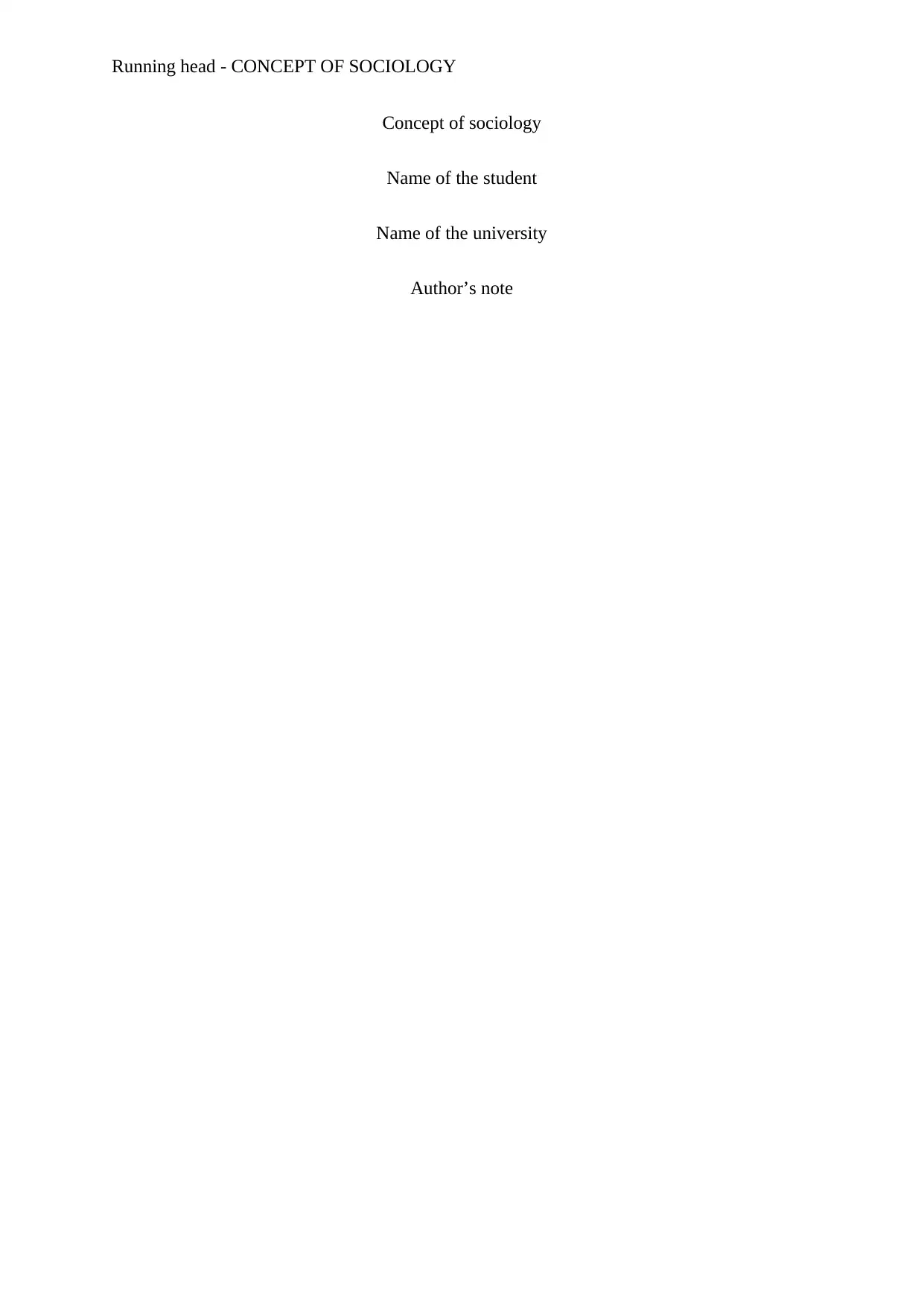
Running head - CONCEPT OF SOCIOLOGY
Concept of sociology
Name of the student
Name of the university
Author’s note
Concept of sociology
Name of the student
Name of the university
Author’s note
Paraphrase This Document
Need a fresh take? Get an instant paraphrase of this document with our AI Paraphraser
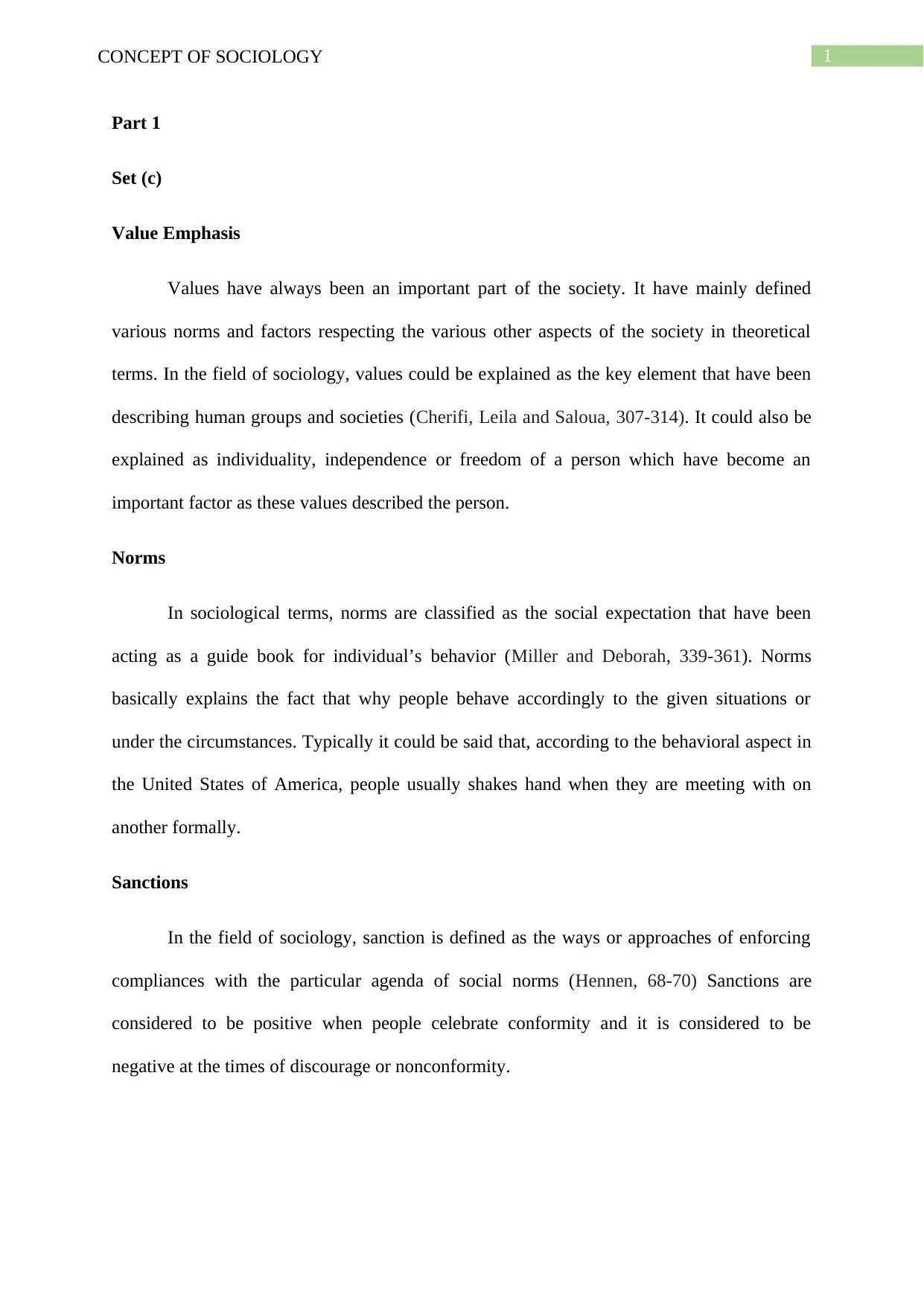
1CONCEPT OF SOCIOLOGY
Part 1
Set (c)
Value Emphasis
Values have always been an important part of the society. It have mainly defined
various norms and factors respecting the various other aspects of the society in theoretical
terms. In the field of sociology, values could be explained as the key element that have been
describing human groups and societies (Cherifi, Leila and Saloua, 307-314). It could also be
explained as individuality, independence or freedom of a person which have become an
important factor as these values described the person.
Norms
In sociological terms, norms are classified as the social expectation that have been
acting as a guide book for individual’s behavior (Miller and Deborah, 339-361). Norms
basically explains the fact that why people behave accordingly to the given situations or
under the circumstances. Typically it could be said that, according to the behavioral aspect in
the United States of America, people usually shakes hand when they are meeting with on
another formally.
Sanctions
In the field of sociology, sanction is defined as the ways or approaches of enforcing
compliances with the particular agenda of social norms (Hennen, 68-70) Sanctions are
considered to be positive when people celebrate conformity and it is considered to be
negative at the times of discourage or nonconformity.
Part 1
Set (c)
Value Emphasis
Values have always been an important part of the society. It have mainly defined
various norms and factors respecting the various other aspects of the society in theoretical
terms. In the field of sociology, values could be explained as the key element that have been
describing human groups and societies (Cherifi, Leila and Saloua, 307-314). It could also be
explained as individuality, independence or freedom of a person which have become an
important factor as these values described the person.
Norms
In sociological terms, norms are classified as the social expectation that have been
acting as a guide book for individual’s behavior (Miller and Deborah, 339-361). Norms
basically explains the fact that why people behave accordingly to the given situations or
under the circumstances. Typically it could be said that, according to the behavioral aspect in
the United States of America, people usually shakes hand when they are meeting with on
another formally.
Sanctions
In the field of sociology, sanction is defined as the ways or approaches of enforcing
compliances with the particular agenda of social norms (Hennen, 68-70) Sanctions are
considered to be positive when people celebrate conformity and it is considered to be
negative at the times of discourage or nonconformity.
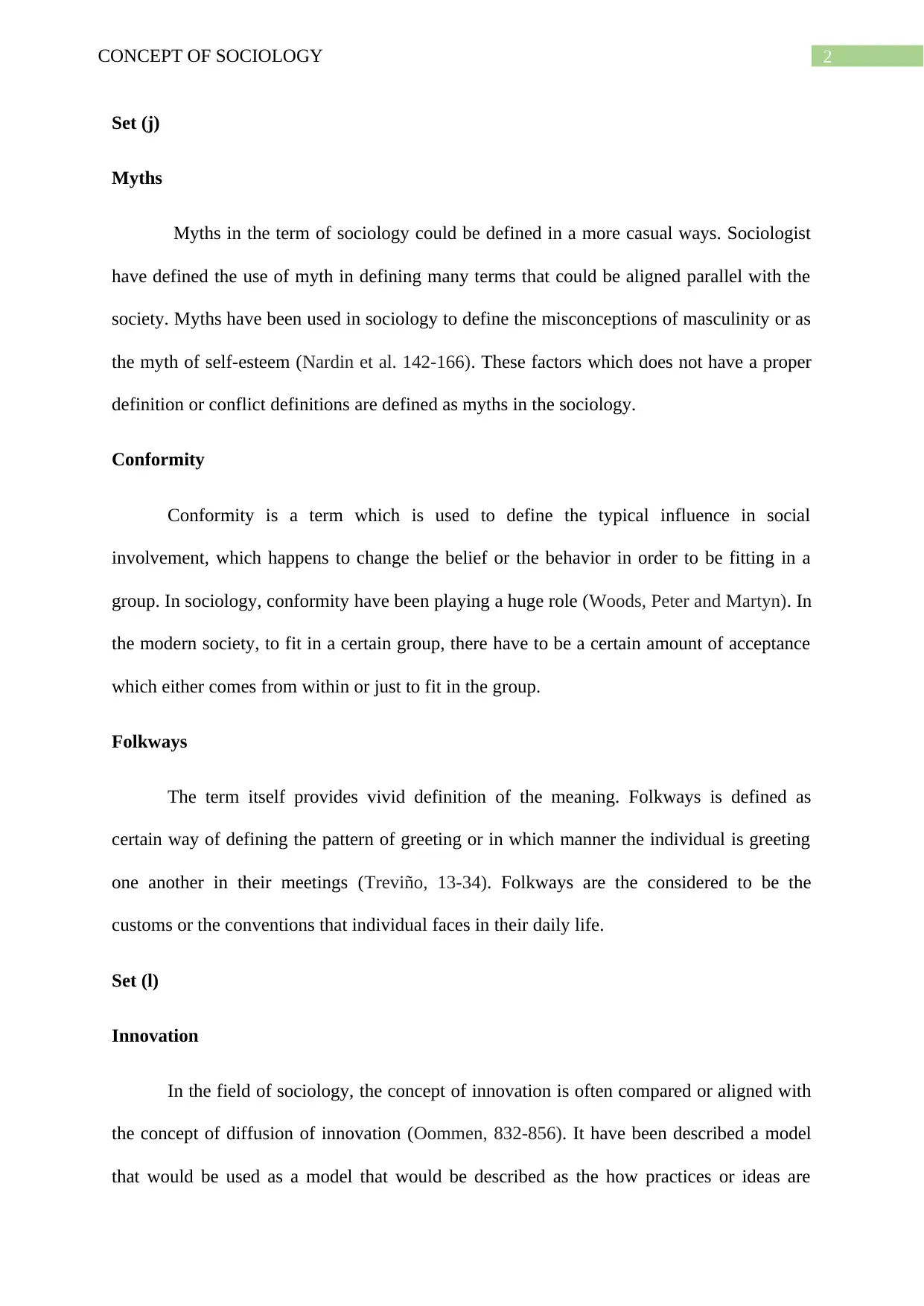
2CONCEPT OF SOCIOLOGY
Set (j)
Myths
Myths in the term of sociology could be defined in a more casual ways. Sociologist
have defined the use of myth in defining many terms that could be aligned parallel with the
society. Myths have been used in sociology to define the misconceptions of masculinity or as
the myth of self-esteem (Nardin et al. 142-166). These factors which does not have a proper
definition or conflict definitions are defined as myths in the sociology.
Conformity
Conformity is a term which is used to define the typical influence in social
involvement, which happens to change the belief or the behavior in order to be fitting in a
group. In sociology, conformity have been playing a huge role (Woods, Peter and Martyn). In
the modern society, to fit in a certain group, there have to be a certain amount of acceptance
which either comes from within or just to fit in the group.
Folkways
The term itself provides vivid definition of the meaning. Folkways is defined as
certain way of defining the pattern of greeting or in which manner the individual is greeting
one another in their meetings (Treviño, 13-34). Folkways are the considered to be the
customs or the conventions that individual faces in their daily life.
Set (l)
Innovation
In the field of sociology, the concept of innovation is often compared or aligned with
the concept of diffusion of innovation (Oommen, 832-856). It have been described a model
that would be used as a model that would be described as the how practices or ideas are
Set (j)
Myths
Myths in the term of sociology could be defined in a more casual ways. Sociologist
have defined the use of myth in defining many terms that could be aligned parallel with the
society. Myths have been used in sociology to define the misconceptions of masculinity or as
the myth of self-esteem (Nardin et al. 142-166). These factors which does not have a proper
definition or conflict definitions are defined as myths in the sociology.
Conformity
Conformity is a term which is used to define the typical influence in social
involvement, which happens to change the belief or the behavior in order to be fitting in a
group. In sociology, conformity have been playing a huge role (Woods, Peter and Martyn). In
the modern society, to fit in a certain group, there have to be a certain amount of acceptance
which either comes from within or just to fit in the group.
Folkways
The term itself provides vivid definition of the meaning. Folkways is defined as
certain way of defining the pattern of greeting or in which manner the individual is greeting
one another in their meetings (Treviño, 13-34). Folkways are the considered to be the
customs or the conventions that individual faces in their daily life.
Set (l)
Innovation
In the field of sociology, the concept of innovation is often compared or aligned with
the concept of diffusion of innovation (Oommen, 832-856). It have been described a model
that would be used as a model that would be described as the how practices or ideas are
⊘ This is a preview!⊘
Do you want full access?
Subscribe today to unlock all pages.

Trusted by 1+ million students worldwide
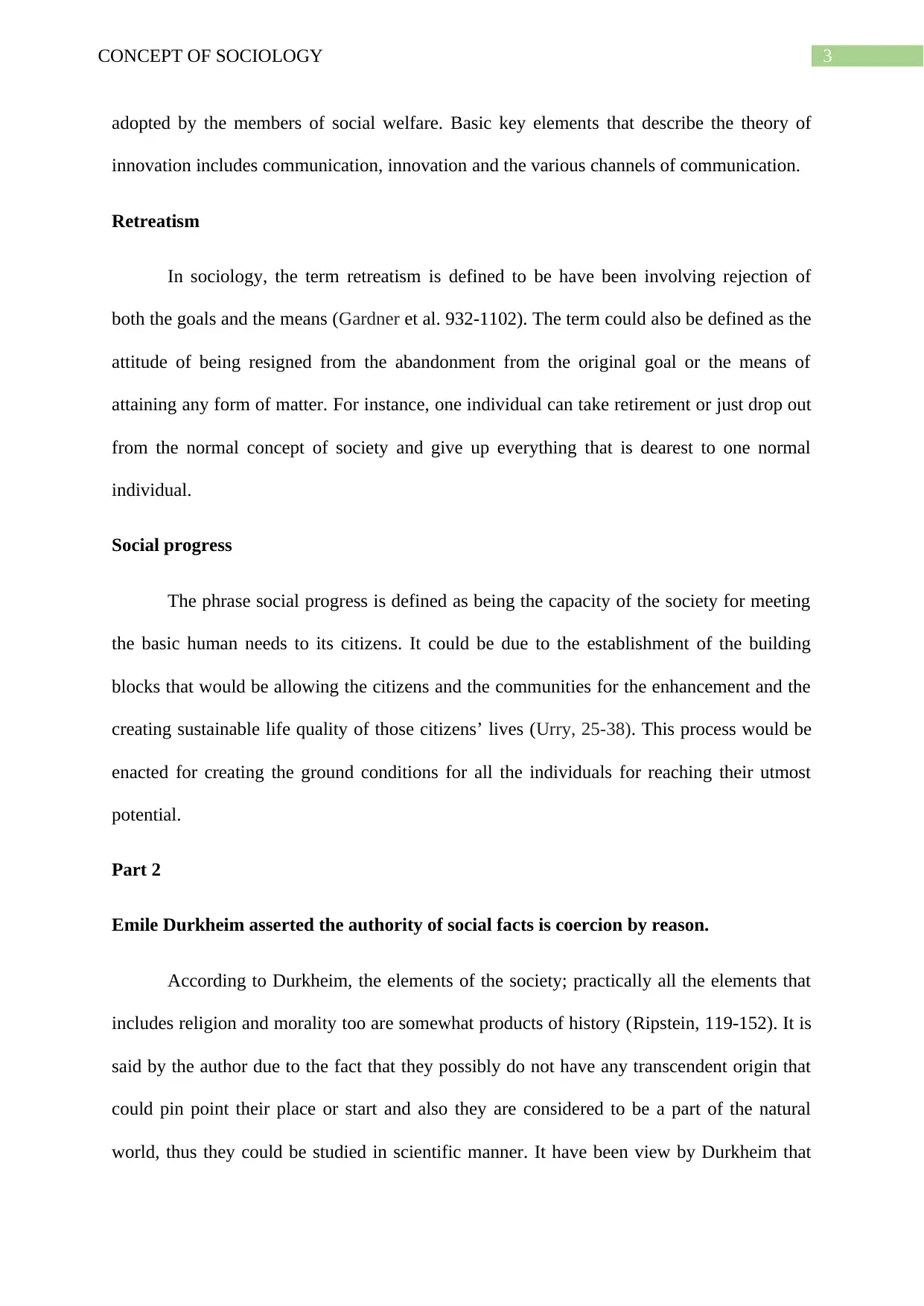
3CONCEPT OF SOCIOLOGY
adopted by the members of social welfare. Basic key elements that describe the theory of
innovation includes communication, innovation and the various channels of communication.
Retreatism
In sociology, the term retreatism is defined to be have been involving rejection of
both the goals and the means (Gardner et al. 932-1102). The term could also be defined as the
attitude of being resigned from the abandonment from the original goal or the means of
attaining any form of matter. For instance, one individual can take retirement or just drop out
from the normal concept of society and give up everything that is dearest to one normal
individual.
Social progress
The phrase social progress is defined as being the capacity of the society for meeting
the basic human needs to its citizens. It could be due to the establishment of the building
blocks that would be allowing the citizens and the communities for the enhancement and the
creating sustainable life quality of those citizens’ lives (Urry, 25-38). This process would be
enacted for creating the ground conditions for all the individuals for reaching their utmost
potential.
Part 2
Emile Durkheim asserted the authority of social facts is coercion by reason.
According to Durkheim, the elements of the society; practically all the elements that
includes religion and morality too are somewhat products of history (Ripstein, 119-152). It is
said by the author due to the fact that they possibly do not have any transcendent origin that
could pin point their place or start and also they are considered to be a part of the natural
world, thus they could be studied in scientific manner. It have been view by Durkheim that
adopted by the members of social welfare. Basic key elements that describe the theory of
innovation includes communication, innovation and the various channels of communication.
Retreatism
In sociology, the term retreatism is defined to be have been involving rejection of
both the goals and the means (Gardner et al. 932-1102). The term could also be defined as the
attitude of being resigned from the abandonment from the original goal or the means of
attaining any form of matter. For instance, one individual can take retirement or just drop out
from the normal concept of society and give up everything that is dearest to one normal
individual.
Social progress
The phrase social progress is defined as being the capacity of the society for meeting
the basic human needs to its citizens. It could be due to the establishment of the building
blocks that would be allowing the citizens and the communities for the enhancement and the
creating sustainable life quality of those citizens’ lives (Urry, 25-38). This process would be
enacted for creating the ground conditions for all the individuals for reaching their utmost
potential.
Part 2
Emile Durkheim asserted the authority of social facts is coercion by reason.
According to Durkheim, the elements of the society; practically all the elements that
includes religion and morality too are somewhat products of history (Ripstein, 119-152). It is
said by the author due to the fact that they possibly do not have any transcendent origin that
could pin point their place or start and also they are considered to be a part of the natural
world, thus they could be studied in scientific manner. It have been view by Durkheim that
Paraphrase This Document
Need a fresh take? Get an instant paraphrase of this document with our AI Paraphraser
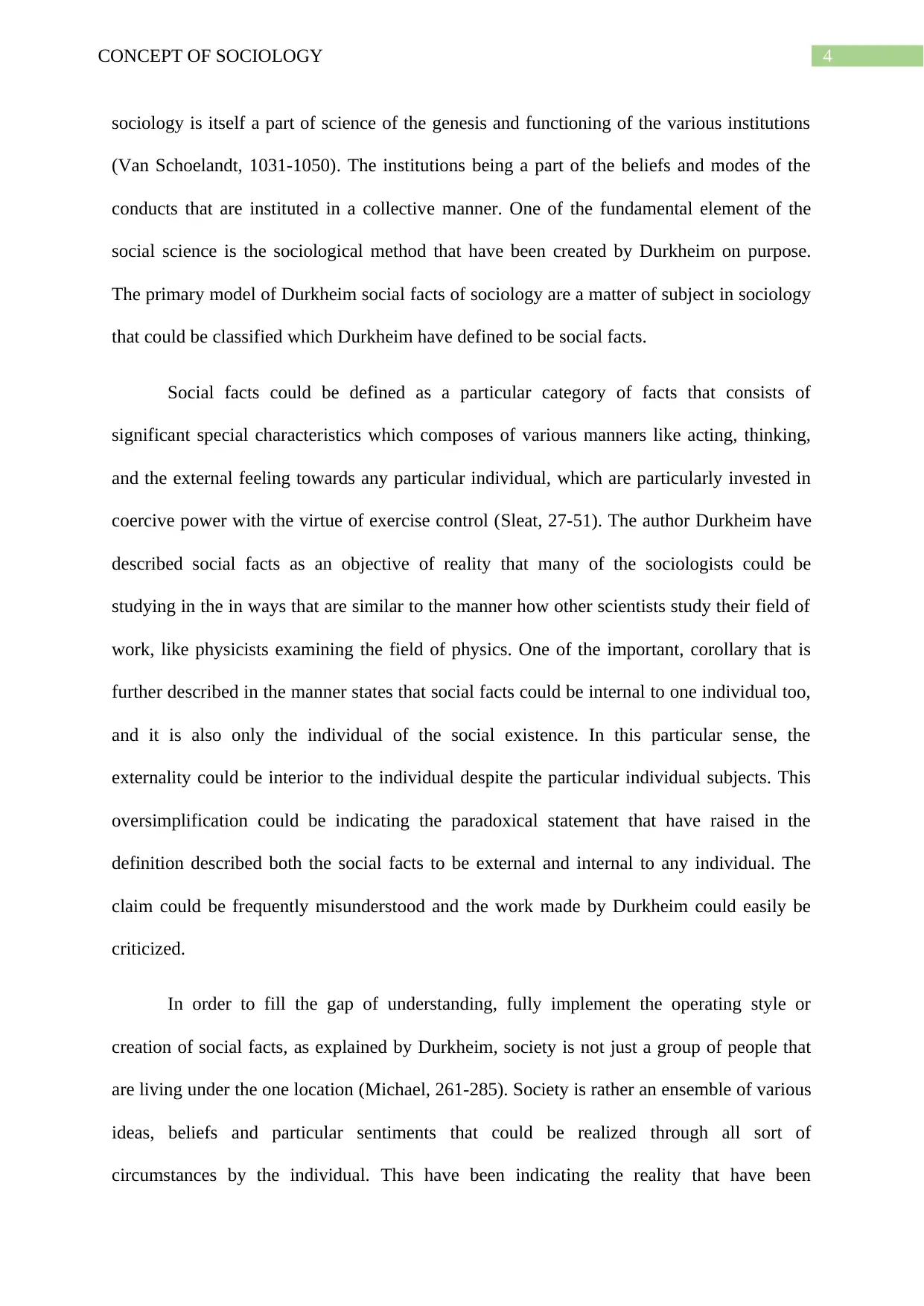
4CONCEPT OF SOCIOLOGY
sociology is itself a part of science of the genesis and functioning of the various institutions
(Van Schoelandt, 1031-1050). The institutions being a part of the beliefs and modes of the
conducts that are instituted in a collective manner. One of the fundamental element of the
social science is the sociological method that have been created by Durkheim on purpose.
The primary model of Durkheim social facts of sociology are a matter of subject in sociology
that could be classified which Durkheim have defined to be social facts.
Social facts could be defined as a particular category of facts that consists of
significant special characteristics which composes of various manners like acting, thinking,
and the external feeling towards any particular individual, which are particularly invested in
coercive power with the virtue of exercise control (Sleat, 27-51). The author Durkheim have
described social facts as an objective of reality that many of the sociologists could be
studying in the in ways that are similar to the manner how other scientists study their field of
work, like physicists examining the field of physics. One of the important, corollary that is
further described in the manner states that social facts could be internal to one individual too,
and it is also only the individual of the social existence. In this particular sense, the
externality could be interior to the individual despite the particular individual subjects. This
oversimplification could be indicating the paradoxical statement that have raised in the
definition described both the social facts to be external and internal to any individual. The
claim could be frequently misunderstood and the work made by Durkheim could easily be
criticized.
In order to fill the gap of understanding, fully implement the operating style or
creation of social facts, as explained by Durkheim, society is not just a group of people that
are living under the one location (Michael, 261-285). Society is rather an ensemble of various
ideas, beliefs and particular sentiments that could be realized through all sort of
circumstances by the individual. This have been indicating the reality that have been
sociology is itself a part of science of the genesis and functioning of the various institutions
(Van Schoelandt, 1031-1050). The institutions being a part of the beliefs and modes of the
conducts that are instituted in a collective manner. One of the fundamental element of the
social science is the sociological method that have been created by Durkheim on purpose.
The primary model of Durkheim social facts of sociology are a matter of subject in sociology
that could be classified which Durkheim have defined to be social facts.
Social facts could be defined as a particular category of facts that consists of
significant special characteristics which composes of various manners like acting, thinking,
and the external feeling towards any particular individual, which are particularly invested in
coercive power with the virtue of exercise control (Sleat, 27-51). The author Durkheim have
described social facts as an objective of reality that many of the sociologists could be
studying in the in ways that are similar to the manner how other scientists study their field of
work, like physicists examining the field of physics. One of the important, corollary that is
further described in the manner states that social facts could be internal to one individual too,
and it is also only the individual of the social existence. In this particular sense, the
externality could be interior to the individual despite the particular individual subjects. This
oversimplification could be indicating the paradoxical statement that have raised in the
definition described both the social facts to be external and internal to any individual. The
claim could be frequently misunderstood and the work made by Durkheim could easily be
criticized.
In order to fill the gap of understanding, fully implement the operating style or
creation of social facts, as explained by Durkheim, society is not just a group of people that
are living under the one location (Michael, 261-285). Society is rather an ensemble of various
ideas, beliefs and particular sentiments that could be realized through all sort of
circumstances by the individual. This have been indicating the reality that have been
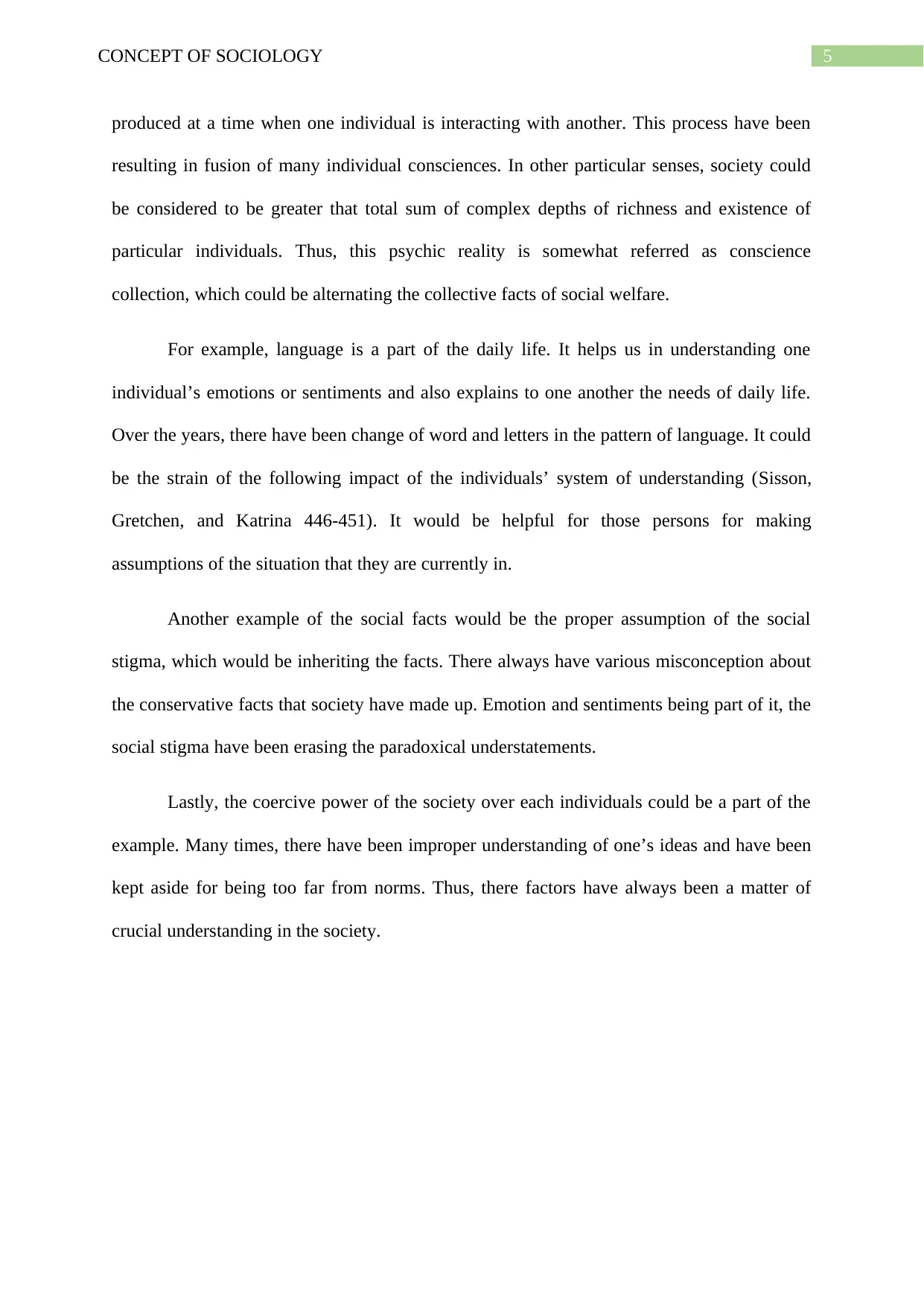
5CONCEPT OF SOCIOLOGY
produced at a time when one individual is interacting with another. This process have been
resulting in fusion of many individual consciences. In other particular senses, society could
be considered to be greater that total sum of complex depths of richness and existence of
particular individuals. Thus, this psychic reality is somewhat referred as conscience
collection, which could be alternating the collective facts of social welfare.
For example, language is a part of the daily life. It helps us in understanding one
individual’s emotions or sentiments and also explains to one another the needs of daily life.
Over the years, there have been change of word and letters in the pattern of language. It could
be the strain of the following impact of the individuals’ system of understanding (Sisson,
Gretchen, and Katrina 446-451). It would be helpful for those persons for making
assumptions of the situation that they are currently in.
Another example of the social facts would be the proper assumption of the social
stigma, which would be inheriting the facts. There always have various misconception about
the conservative facts that society have made up. Emotion and sentiments being part of it, the
social stigma have been erasing the paradoxical understatements.
Lastly, the coercive power of the society over each individuals could be a part of the
example. Many times, there have been improper understanding of one’s ideas and have been
kept aside for being too far from norms. Thus, there factors have always been a matter of
crucial understanding in the society.
produced at a time when one individual is interacting with another. This process have been
resulting in fusion of many individual consciences. In other particular senses, society could
be considered to be greater that total sum of complex depths of richness and existence of
particular individuals. Thus, this psychic reality is somewhat referred as conscience
collection, which could be alternating the collective facts of social welfare.
For example, language is a part of the daily life. It helps us in understanding one
individual’s emotions or sentiments and also explains to one another the needs of daily life.
Over the years, there have been change of word and letters in the pattern of language. It could
be the strain of the following impact of the individuals’ system of understanding (Sisson,
Gretchen, and Katrina 446-451). It would be helpful for those persons for making
assumptions of the situation that they are currently in.
Another example of the social facts would be the proper assumption of the social
stigma, which would be inheriting the facts. There always have various misconception about
the conservative facts that society have made up. Emotion and sentiments being part of it, the
social stigma have been erasing the paradoxical understatements.
Lastly, the coercive power of the society over each individuals could be a part of the
example. Many times, there have been improper understanding of one’s ideas and have been
kept aside for being too far from norms. Thus, there factors have always been a matter of
crucial understanding in the society.
⊘ This is a preview!⊘
Do you want full access?
Subscribe today to unlock all pages.

Trusted by 1+ million students worldwide
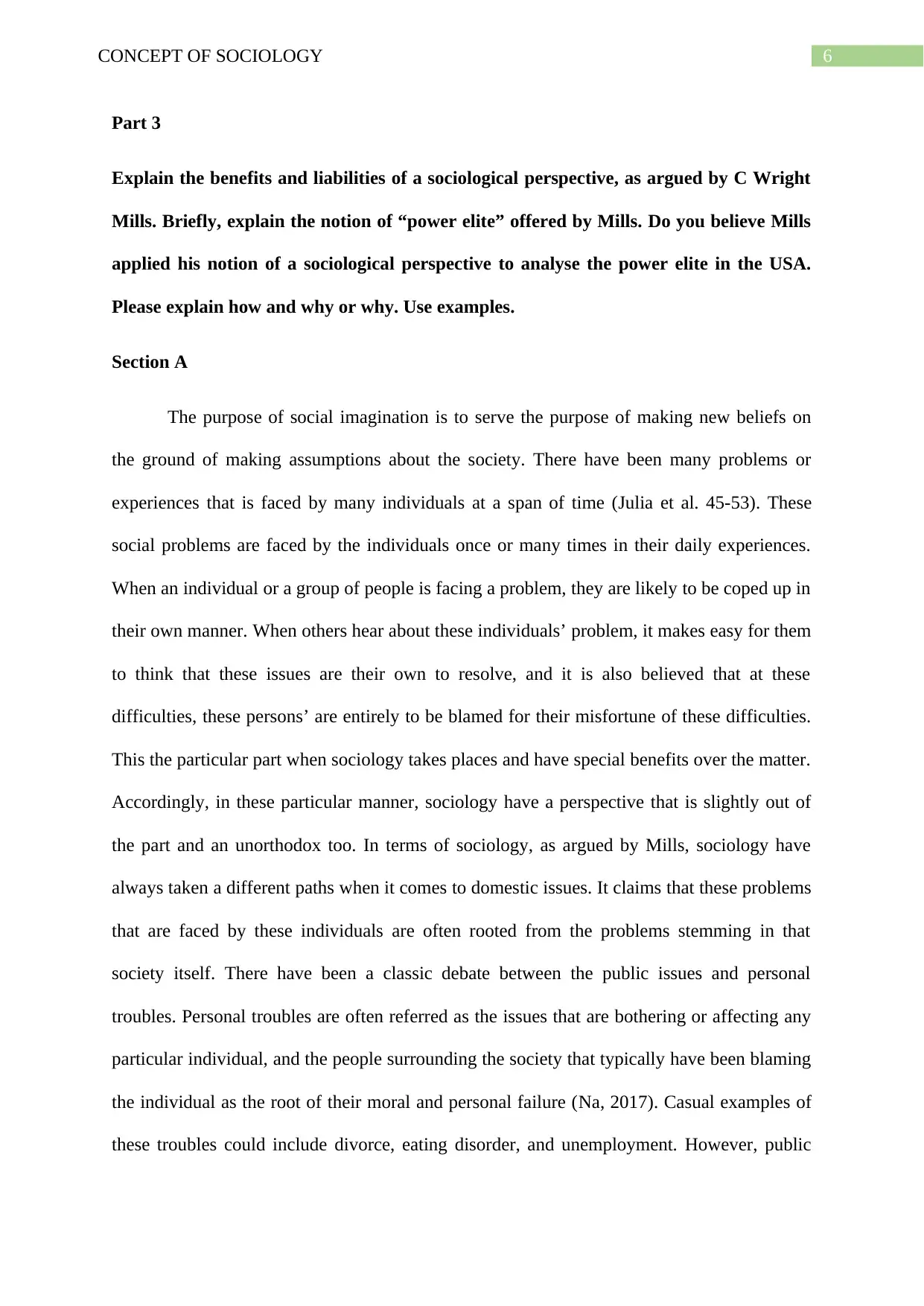
6CONCEPT OF SOCIOLOGY
Part 3
Explain the benefits and liabilities of a sociological perspective, as argued by C Wright
Mills. Briefly, explain the notion of “power elite” offered by Mills. Do you believe Mills
applied his notion of a sociological perspective to analyse the power elite in the USA.
Please explain how and why or why. Use examples.
Section A
The purpose of social imagination is to serve the purpose of making new beliefs on
the ground of making assumptions about the society. There have been many problems or
experiences that is faced by many individuals at a span of time (Julia et al. 45-53). These
social problems are faced by the individuals once or many times in their daily experiences.
When an individual or a group of people is facing a problem, they are likely to be coped up in
their own manner. When others hear about these individuals’ problem, it makes easy for them
to think that these issues are their own to resolve, and it is also believed that at these
difficulties, these persons’ are entirely to be blamed for their misfortune of these difficulties.
This the particular part when sociology takes places and have special benefits over the matter.
Accordingly, in these particular manner, sociology have a perspective that is slightly out of
the part and an unorthodox too. In terms of sociology, as argued by Mills, sociology have
always taken a different paths when it comes to domestic issues. It claims that these problems
that are faced by these individuals are often rooted from the problems stemming in that
society itself. There have been a classic debate between the public issues and personal
troubles. Personal troubles are often referred as the issues that are bothering or affecting any
particular individual, and the people surrounding the society that typically have been blaming
the individual as the root of their moral and personal failure (Na, 2017). Casual examples of
these troubles could include divorce, eating disorder, and unemployment. However, public
Part 3
Explain the benefits and liabilities of a sociological perspective, as argued by C Wright
Mills. Briefly, explain the notion of “power elite” offered by Mills. Do you believe Mills
applied his notion of a sociological perspective to analyse the power elite in the USA.
Please explain how and why or why. Use examples.
Section A
The purpose of social imagination is to serve the purpose of making new beliefs on
the ground of making assumptions about the society. There have been many problems or
experiences that is faced by many individuals at a span of time (Julia et al. 45-53). These
social problems are faced by the individuals once or many times in their daily experiences.
When an individual or a group of people is facing a problem, they are likely to be coped up in
their own manner. When others hear about these individuals’ problem, it makes easy for them
to think that these issues are their own to resolve, and it is also believed that at these
difficulties, these persons’ are entirely to be blamed for their misfortune of these difficulties.
This the particular part when sociology takes places and have special benefits over the matter.
Accordingly, in these particular manner, sociology have a perspective that is slightly out of
the part and an unorthodox too. In terms of sociology, as argued by Mills, sociology have
always taken a different paths when it comes to domestic issues. It claims that these problems
that are faced by these individuals are often rooted from the problems stemming in that
society itself. There have been a classic debate between the public issues and personal
troubles. Personal troubles are often referred as the issues that are bothering or affecting any
particular individual, and the people surrounding the society that typically have been blaming
the individual as the root of their moral and personal failure (Na, 2017). Casual examples of
these troubles could include divorce, eating disorder, and unemployment. However, public
Paraphrase This Document
Need a fresh take? Get an instant paraphrase of this document with our AI Paraphraser
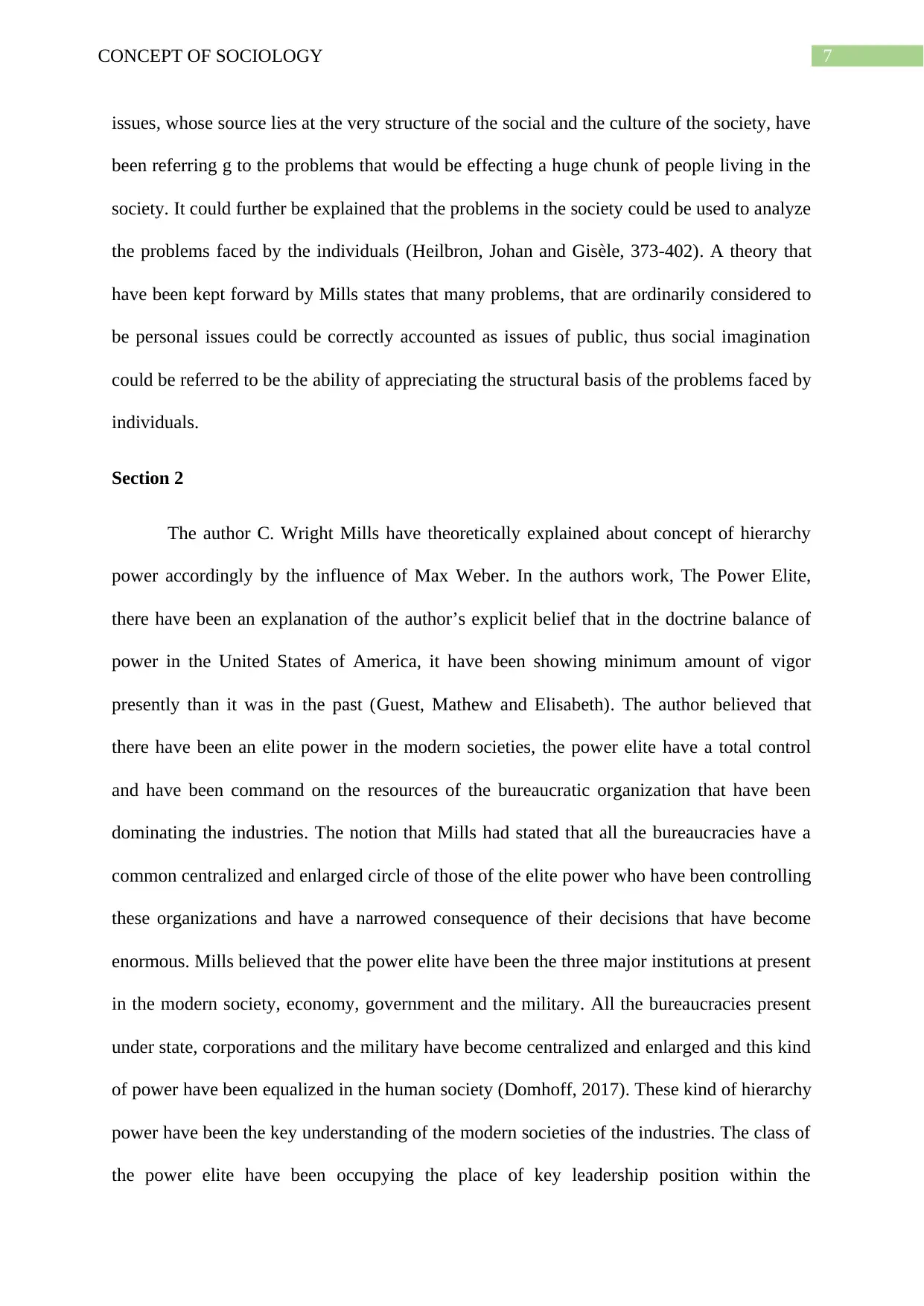
7CONCEPT OF SOCIOLOGY
issues, whose source lies at the very structure of the social and the culture of the society, have
been referring g to the problems that would be effecting a huge chunk of people living in the
society. It could further be explained that the problems in the society could be used to analyze
the problems faced by the individuals (Heilbron, Johan and Gisèle, 373-402). A theory that
have been kept forward by Mills states that many problems, that are ordinarily considered to
be personal issues could be correctly accounted as issues of public, thus social imagination
could be referred to be the ability of appreciating the structural basis of the problems faced by
individuals.
Section 2
The author C. Wright Mills have theoretically explained about concept of hierarchy
power accordingly by the influence of Max Weber. In the authors work, The Power Elite,
there have been an explanation of the author’s explicit belief that in the doctrine balance of
power in the United States of America, it have been showing minimum amount of vigor
presently than it was in the past (Guest, Mathew and Elisabeth). The author believed that
there have been an elite power in the modern societies, the power elite have a total control
and have been command on the resources of the bureaucratic organization that have been
dominating the industries. The notion that Mills had stated that all the bureaucracies have a
common centralized and enlarged circle of those of the elite power who have been controlling
these organizations and have a narrowed consequence of their decisions that have become
enormous. Mills believed that the power elite have been the three major institutions at present
in the modern society, economy, government and the military. All the bureaucracies present
under state, corporations and the military have become centralized and enlarged and this kind
of power have been equalized in the human society (Domhoff, 2017). These kind of hierarchy
power have been the key understanding of the modern societies of the industries. The class of
the power elite have been occupying the place of key leadership position within the
issues, whose source lies at the very structure of the social and the culture of the society, have
been referring g to the problems that would be effecting a huge chunk of people living in the
society. It could further be explained that the problems in the society could be used to analyze
the problems faced by the individuals (Heilbron, Johan and Gisèle, 373-402). A theory that
have been kept forward by Mills states that many problems, that are ordinarily considered to
be personal issues could be correctly accounted as issues of public, thus social imagination
could be referred to be the ability of appreciating the structural basis of the problems faced by
individuals.
Section 2
The author C. Wright Mills have theoretically explained about concept of hierarchy
power accordingly by the influence of Max Weber. In the authors work, The Power Elite,
there have been an explanation of the author’s explicit belief that in the doctrine balance of
power in the United States of America, it have been showing minimum amount of vigor
presently than it was in the past (Guest, Mathew and Elisabeth). The author believed that
there have been an elite power in the modern societies, the power elite have a total control
and have been command on the resources of the bureaucratic organization that have been
dominating the industries. The notion that Mills had stated that all the bureaucracies have a
common centralized and enlarged circle of those of the elite power who have been controlling
these organizations and have a narrowed consequence of their decisions that have become
enormous. Mills believed that the power elite have been the three major institutions at present
in the modern society, economy, government and the military. All the bureaucracies present
under state, corporations and the military have become centralized and enlarged and this kind
of power have been equalized in the human society (Domhoff, 2017). These kind of hierarchy
power have been the key understanding of the modern societies of the industries. The class of
the power elite have been occupying the place of key leadership position within the
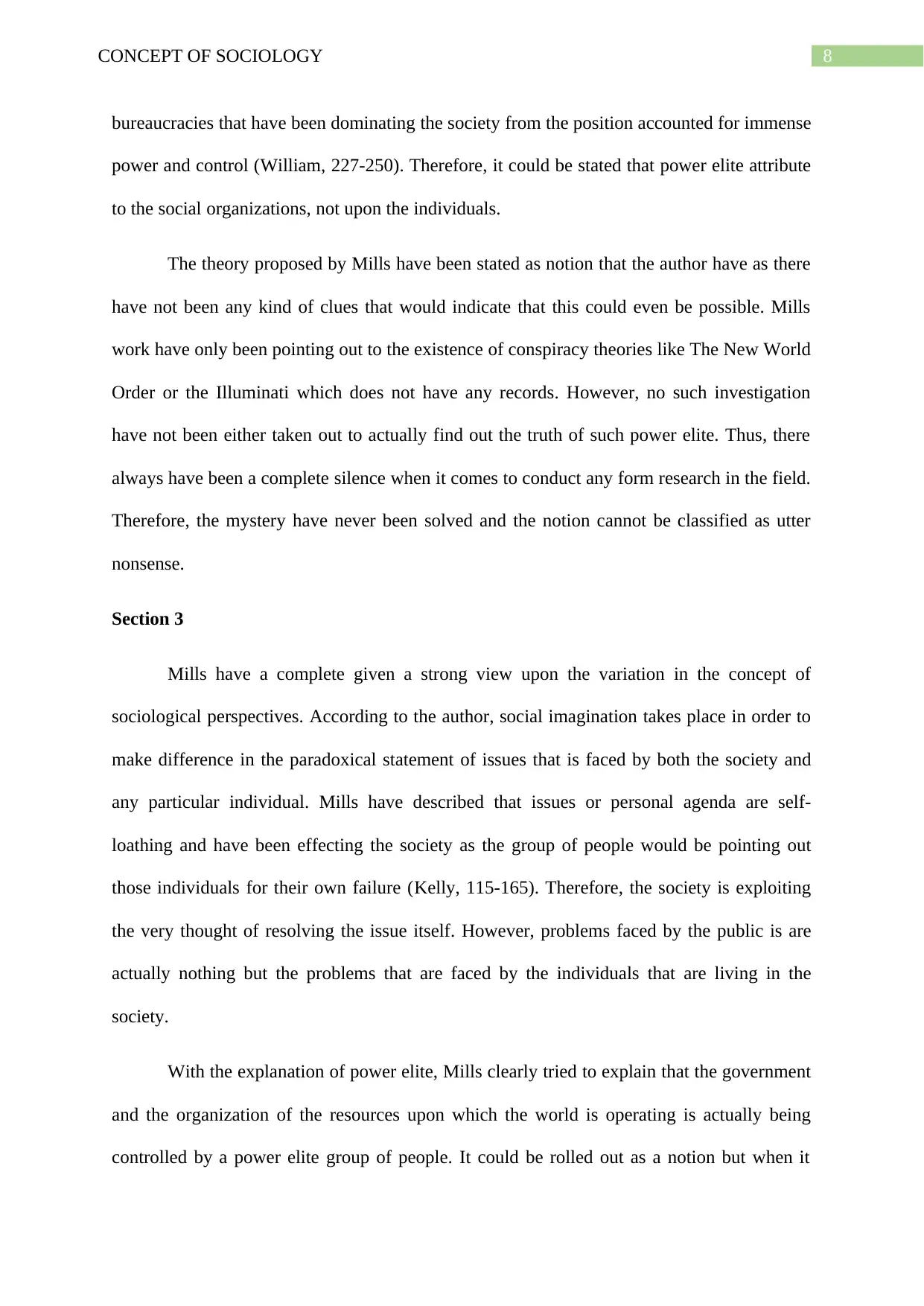
8CONCEPT OF SOCIOLOGY
bureaucracies that have been dominating the society from the position accounted for immense
power and control (William, 227-250). Therefore, it could be stated that power elite attribute
to the social organizations, not upon the individuals.
The theory proposed by Mills have been stated as notion that the author have as there
have not been any kind of clues that would indicate that this could even be possible. Mills
work have only been pointing out to the existence of conspiracy theories like The New World
Order or the Illuminati which does not have any records. However, no such investigation
have not been either taken out to actually find out the truth of such power elite. Thus, there
always have been a complete silence when it comes to conduct any form research in the field.
Therefore, the mystery have never been solved and the notion cannot be classified as utter
nonsense.
Section 3
Mills have a complete given a strong view upon the variation in the concept of
sociological perspectives. According to the author, social imagination takes place in order to
make difference in the paradoxical statement of issues that is faced by both the society and
any particular individual. Mills have described that issues or personal agenda are self-
loathing and have been effecting the society as the group of people would be pointing out
those individuals for their own failure (Kelly, 115-165). Therefore, the society is exploiting
the very thought of resolving the issue itself. However, problems faced by the public is are
actually nothing but the problems that are faced by the individuals that are living in the
society.
With the explanation of power elite, Mills clearly tried to explain that the government
and the organization of the resources upon which the world is operating is actually being
controlled by a power elite group of people. It could be rolled out as a notion but when it
bureaucracies that have been dominating the society from the position accounted for immense
power and control (William, 227-250). Therefore, it could be stated that power elite attribute
to the social organizations, not upon the individuals.
The theory proposed by Mills have been stated as notion that the author have as there
have not been any kind of clues that would indicate that this could even be possible. Mills
work have only been pointing out to the existence of conspiracy theories like The New World
Order or the Illuminati which does not have any records. However, no such investigation
have not been either taken out to actually find out the truth of such power elite. Thus, there
always have been a complete silence when it comes to conduct any form research in the field.
Therefore, the mystery have never been solved and the notion cannot be classified as utter
nonsense.
Section 3
Mills have a complete given a strong view upon the variation in the concept of
sociological perspectives. According to the author, social imagination takes place in order to
make difference in the paradoxical statement of issues that is faced by both the society and
any particular individual. Mills have described that issues or personal agenda are self-
loathing and have been effecting the society as the group of people would be pointing out
those individuals for their own failure (Kelly, 115-165). Therefore, the society is exploiting
the very thought of resolving the issue itself. However, problems faced by the public is are
actually nothing but the problems that are faced by the individuals that are living in the
society.
With the explanation of power elite, Mills clearly tried to explain that the government
and the organization of the resources upon which the world is operating is actually being
controlled by a power elite group of people. It could be rolled out as a notion but when it
⊘ This is a preview!⊘
Do you want full access?
Subscribe today to unlock all pages.

Trusted by 1+ million students worldwide
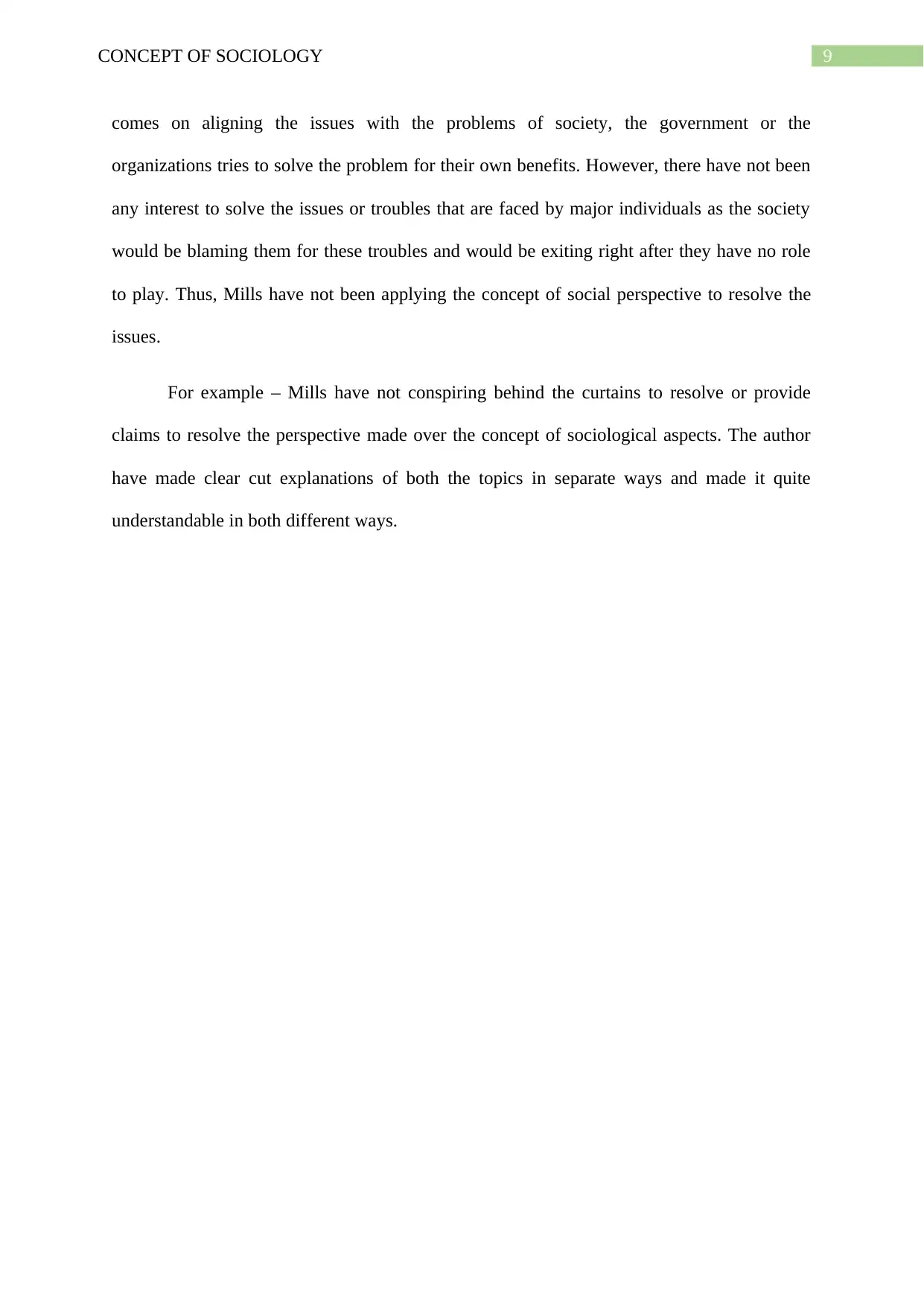
9CONCEPT OF SOCIOLOGY
comes on aligning the issues with the problems of society, the government or the
organizations tries to solve the problem for their own benefits. However, there have not been
any interest to solve the issues or troubles that are faced by major individuals as the society
would be blaming them for these troubles and would be exiting right after they have no role
to play. Thus, Mills have not been applying the concept of social perspective to resolve the
issues.
For example – Mills have not conspiring behind the curtains to resolve or provide
claims to resolve the perspective made over the concept of sociological aspects. The author
have made clear cut explanations of both the topics in separate ways and made it quite
understandable in both different ways.
comes on aligning the issues with the problems of society, the government or the
organizations tries to solve the problem for their own benefits. However, there have not been
any interest to solve the issues or troubles that are faced by major individuals as the society
would be blaming them for these troubles and would be exiting right after they have no role
to play. Thus, Mills have not been applying the concept of social perspective to resolve the
issues.
For example – Mills have not conspiring behind the curtains to resolve or provide
claims to resolve the perspective made over the concept of sociological aspects. The author
have made clear cut explanations of both the topics in separate ways and made it quite
understandable in both different ways.
Paraphrase This Document
Need a fresh take? Get an instant paraphrase of this document with our AI Paraphraser
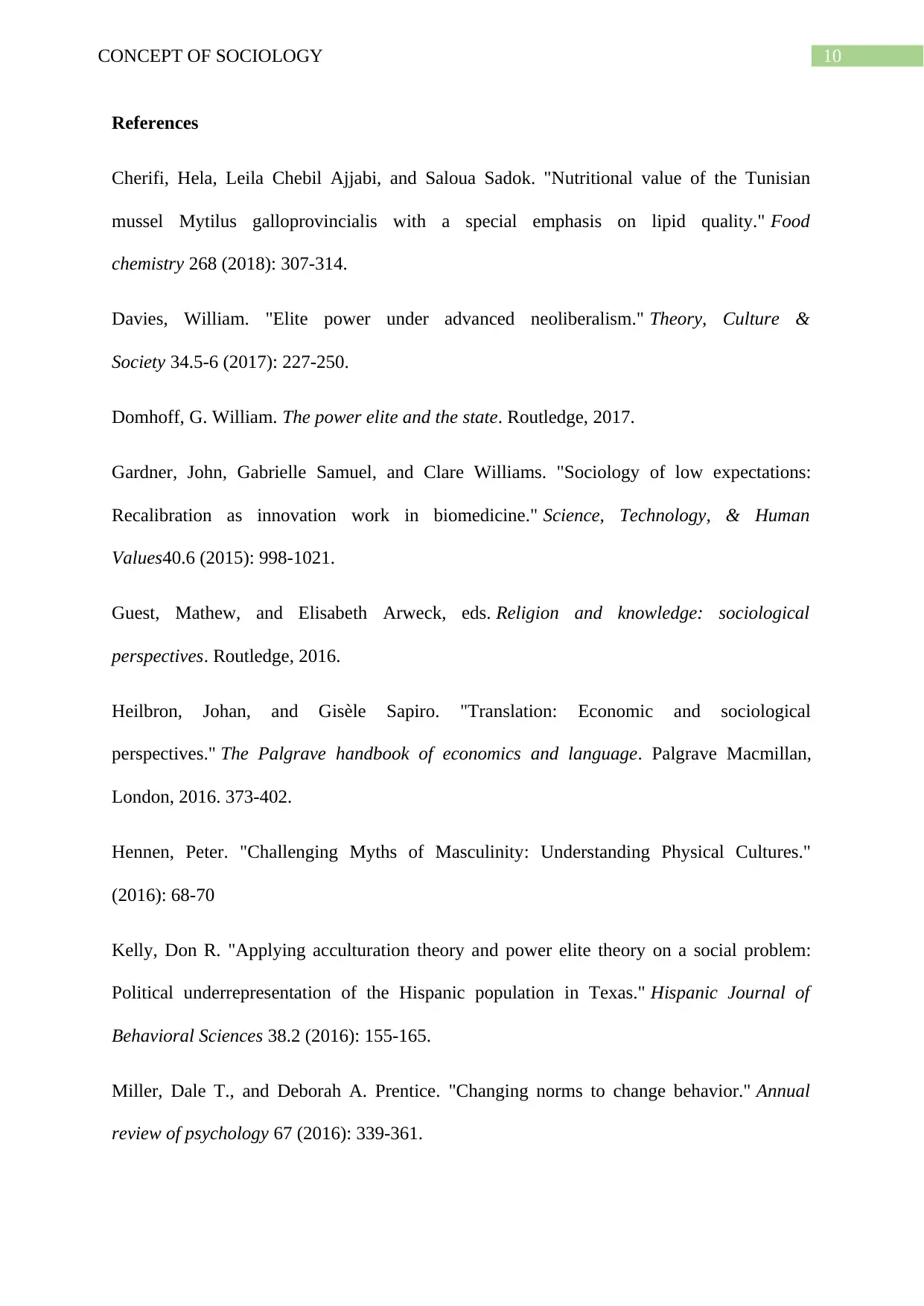
10CONCEPT OF SOCIOLOGY
References
Cherifi, Hela, Leila Chebil Ajjabi, and Saloua Sadok. "Nutritional value of the Tunisian
mussel Mytilus galloprovincialis with a special emphasis on lipid quality." Food
chemistry 268 (2018): 307-314.
Davies, William. "Elite power under advanced neoliberalism." Theory, Culture &
Society 34.5-6 (2017): 227-250.
Domhoff, G. William. The power elite and the state. Routledge, 2017.
Gardner, John, Gabrielle Samuel, and Clare Williams. "Sociology of low expectations:
Recalibration as innovation work in biomedicine." Science, Technology, & Human
Values40.6 (2015): 998-1021.
Guest, Mathew, and Elisabeth Arweck, eds. Religion and knowledge: sociological
perspectives. Routledge, 2016.
Heilbron, Johan, and Gisèle Sapiro. "Translation: Economic and sociological
perspectives." The Palgrave handbook of economics and language. Palgrave Macmillan,
London, 2016. 373-402.
Hennen, Peter. "Challenging Myths of Masculinity: Understanding Physical Cultures."
(2016): 68-70
Kelly, Don R. "Applying acculturation theory and power elite theory on a social problem:
Political underrepresentation of the Hispanic population in Texas." Hispanic Journal of
Behavioral Sciences 38.2 (2016): 155-165.
Miller, Dale T., and Deborah A. Prentice. "Changing norms to change behavior." Annual
review of psychology 67 (2016): 339-361.
References
Cherifi, Hela, Leila Chebil Ajjabi, and Saloua Sadok. "Nutritional value of the Tunisian
mussel Mytilus galloprovincialis with a special emphasis on lipid quality." Food
chemistry 268 (2018): 307-314.
Davies, William. "Elite power under advanced neoliberalism." Theory, Culture &
Society 34.5-6 (2017): 227-250.
Domhoff, G. William. The power elite and the state. Routledge, 2017.
Gardner, John, Gabrielle Samuel, and Clare Williams. "Sociology of low expectations:
Recalibration as innovation work in biomedicine." Science, Technology, & Human
Values40.6 (2015): 998-1021.
Guest, Mathew, and Elisabeth Arweck, eds. Religion and knowledge: sociological
perspectives. Routledge, 2016.
Heilbron, Johan, and Gisèle Sapiro. "Translation: Economic and sociological
perspectives." The Palgrave handbook of economics and language. Palgrave Macmillan,
London, 2016. 373-402.
Hennen, Peter. "Challenging Myths of Masculinity: Understanding Physical Cultures."
(2016): 68-70
Kelly, Don R. "Applying acculturation theory and power elite theory on a social problem:
Political underrepresentation of the Hispanic population in Texas." Hispanic Journal of
Behavioral Sciences 38.2 (2016): 155-165.
Miller, Dale T., and Deborah A. Prentice. "Changing norms to change behavior." Annual
review of psychology 67 (2016): 339-361.
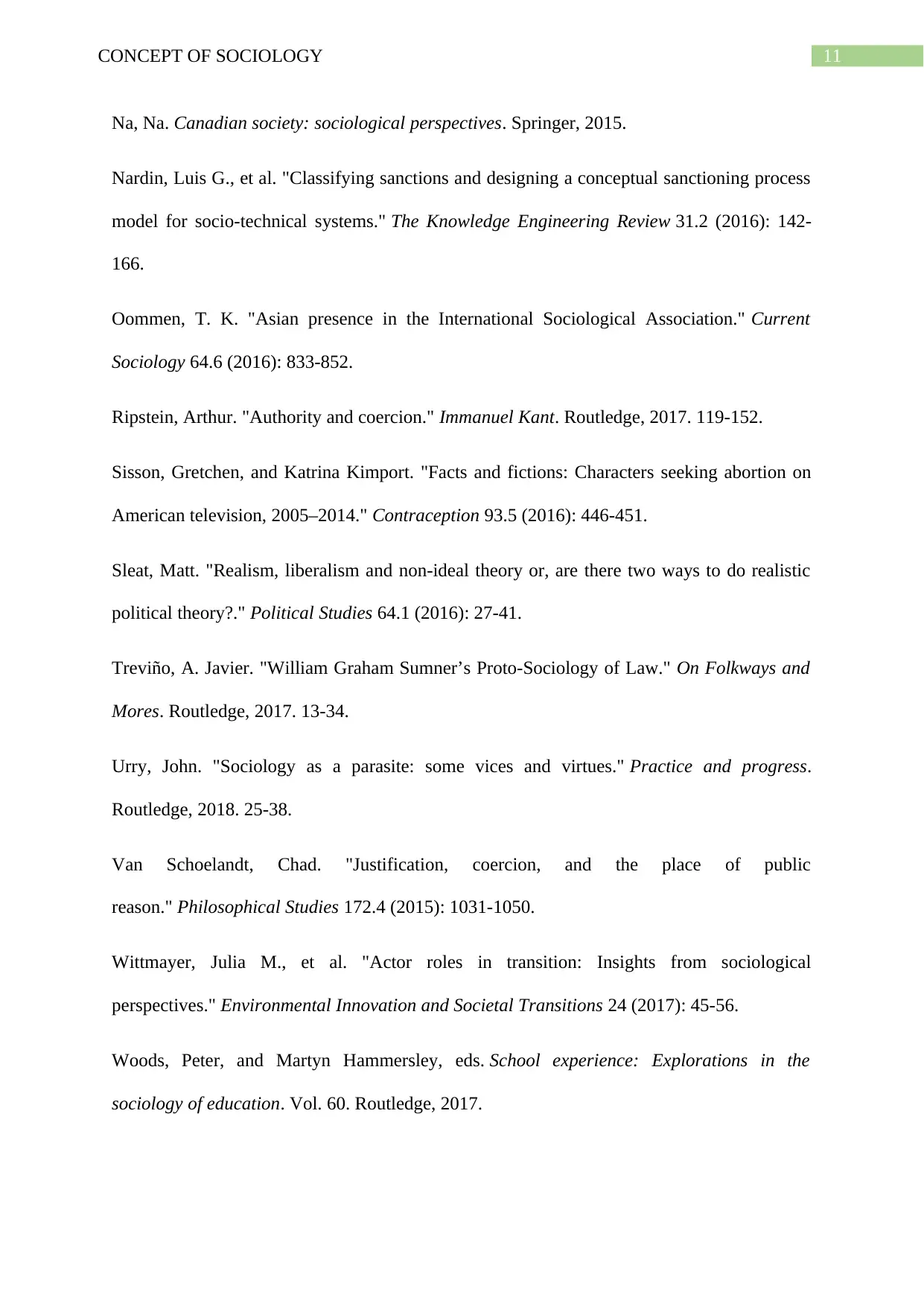
11CONCEPT OF SOCIOLOGY
Na, Na. Canadian society: sociological perspectives. Springer, 2015.
Nardin, Luis G., et al. "Classifying sanctions and designing a conceptual sanctioning process
model for socio-technical systems." The Knowledge Engineering Review 31.2 (2016): 142-
166.
Oommen, T. K. "Asian presence in the International Sociological Association." Current
Sociology 64.6 (2016): 833-852.
Ripstein, Arthur. "Authority and coercion." Immanuel Kant. Routledge, 2017. 119-152.
Sisson, Gretchen, and Katrina Kimport. "Facts and fictions: Characters seeking abortion on
American television, 2005–2014." Contraception 93.5 (2016): 446-451.
Sleat, Matt. "Realism, liberalism and non-ideal theory or, are there two ways to do realistic
political theory?." Political Studies 64.1 (2016): 27-41.
Treviño, A. Javier. "William Graham Sumner’s Proto-Sociology of Law." On Folkways and
Mores. Routledge, 2017. 13-34.
Urry, John. "Sociology as a parasite: some vices and virtues." Practice and progress.
Routledge, 2018. 25-38.
Van Schoelandt, Chad. "Justification, coercion, and the place of public
reason." Philosophical Studies 172.4 (2015): 1031-1050.
Wittmayer, Julia M., et al. "Actor roles in transition: Insights from sociological
perspectives." Environmental Innovation and Societal Transitions 24 (2017): 45-56.
Woods, Peter, and Martyn Hammersley, eds. School experience: Explorations in the
sociology of education. Vol. 60. Routledge, 2017.
Na, Na. Canadian society: sociological perspectives. Springer, 2015.
Nardin, Luis G., et al. "Classifying sanctions and designing a conceptual sanctioning process
model for socio-technical systems." The Knowledge Engineering Review 31.2 (2016): 142-
166.
Oommen, T. K. "Asian presence in the International Sociological Association." Current
Sociology 64.6 (2016): 833-852.
Ripstein, Arthur. "Authority and coercion." Immanuel Kant. Routledge, 2017. 119-152.
Sisson, Gretchen, and Katrina Kimport. "Facts and fictions: Characters seeking abortion on
American television, 2005–2014." Contraception 93.5 (2016): 446-451.
Sleat, Matt. "Realism, liberalism and non-ideal theory or, are there two ways to do realistic
political theory?." Political Studies 64.1 (2016): 27-41.
Treviño, A. Javier. "William Graham Sumner’s Proto-Sociology of Law." On Folkways and
Mores. Routledge, 2017. 13-34.
Urry, John. "Sociology as a parasite: some vices and virtues." Practice and progress.
Routledge, 2018. 25-38.
Van Schoelandt, Chad. "Justification, coercion, and the place of public
reason." Philosophical Studies 172.4 (2015): 1031-1050.
Wittmayer, Julia M., et al. "Actor roles in transition: Insights from sociological
perspectives." Environmental Innovation and Societal Transitions 24 (2017): 45-56.
Woods, Peter, and Martyn Hammersley, eds. School experience: Explorations in the
sociology of education. Vol. 60. Routledge, 2017.
⊘ This is a preview!⊘
Do you want full access?
Subscribe today to unlock all pages.

Trusted by 1+ million students worldwide
1 out of 13
Related Documents
Your All-in-One AI-Powered Toolkit for Academic Success.
+13062052269
info@desklib.com
Available 24*7 on WhatsApp / Email
![[object Object]](/_next/static/media/star-bottom.7253800d.svg)
Unlock your academic potential
Copyright © 2020–2026 A2Z Services. All Rights Reserved. Developed and managed by ZUCOL.





